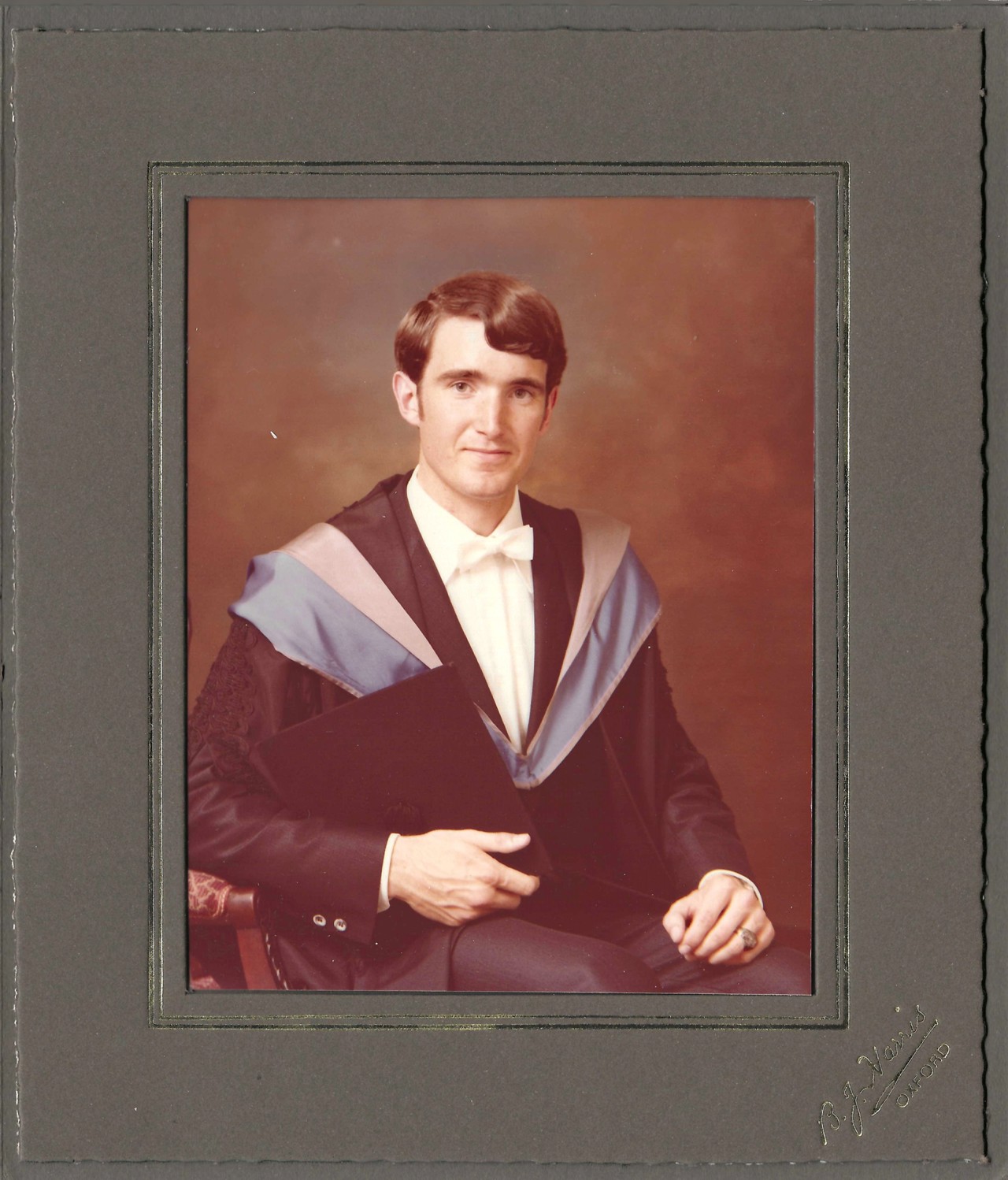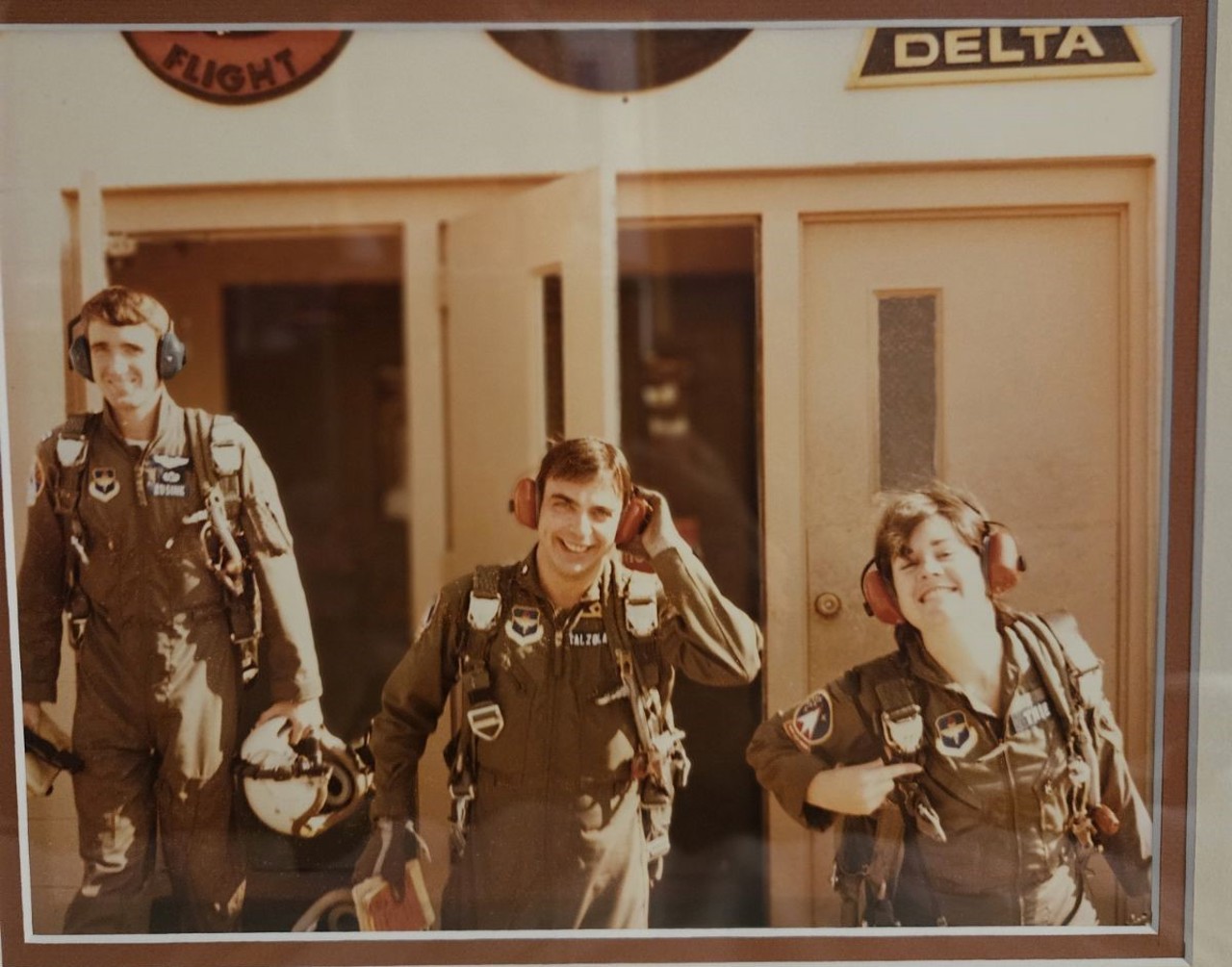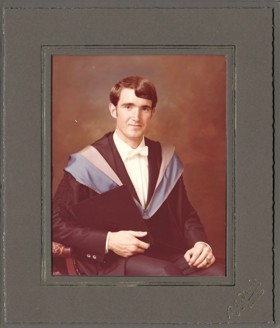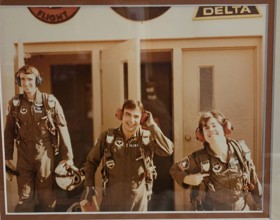Born in 1954 in Seattle, Washington, John Ausink studied at the Air Force Academy before going to Oxford to take an MSc in Mathematics. After Oxford, he returned to the US to train as a pilot and work as an instructor pilot. Ausink took a PhD at the Kennedy School of Government and was then associate professor at the Air Force Academy, teaching mathematical sciences. He went on to hold a National Defense Fellowship at Georgetown University and to work at the Pentagon before joining the RAND Corporation where he is now an adjunct senior policy researcher. Ausink and his wife, Elaine, are strong supporters of educational work and they continue to contribute to the Rhodes Scholarships in Africa. This narrative is excerpted and edited from an interview with the Rhodes Trust on 14 June 2024.
John Ausink
Wyoming & Merton 1976




'That’s what I want to do. I want to fly airplanes'
When I was a child, we moved around a lot for my dad’s work. I had two sisters, one older and one younger sister who was disabled and died when she was 16. One of the things I admire about my parents is the way that they looked after her and included her in everything. They showed me what it’s like to care about people who need care. We spent the years from second grade through middle school moving from Washington to South Dakota, back to Washington, then on to California and North Dakota and then finally to Wyoming, which became the closest place to home for me.
At school, I was active in sports, but I spent most of my time reading, to the point where my mom would often say, ‘Go outside. Stop reading!’ I had some wonderful teachers, including one who gave me my love of mathematics. When I was in high school, I attended Boys State, where someone from the Air Force Academy gave a presentation. I had always been interested in flying, probably because my dad worked at Boeing, and the presentation was so great that I said to myself, ‘That’s what I want to do. I want to fly airplanes.’ I also knew that my dream of being a mathematician would mean a college like MIT or Harvard, which my family couldn’t afford. So, part of the reason I chose the Academy was because it meant I could be a pilot and get a free education.
On applying for the Rhodes Scholarship
I enjoyed the academics at the Academy, and learning to fly a sailplane and to parachute. I was lucky enough to have a superb physics instructor and a great math instructor too, whom I ended up working with at the RAND Corporation many years later. I first heard about the Rhodes Scholarship early on in my time at the Academy. I thought, ‘Wow, that sounds really cool,’ and then promptly forgot all about it. But in my junior year, the Academy invited me to participate, and they went on to nominate me.
At that time, there were two rounds of interviews, one in the state and then one at district level. When it came to getting to the district interviews in Seattle, my friend Jeff and I were faced with a weather system and an airline strike. It looked like we weren’t going to make it, but at the last minute, Jeff’s dad found someone who could fly us to Portland. So, we hopped on this airplane, and then, in Portland, we rented a car and drove to Seattle. I remember the interview as enjoyable, but by the time they came to announce the winner, I was so sleep-deprived that I was in a kind of fog. Jeff turned to me and said, ‘Hey, you got it!’ When we went out to get the rental car to make the long trip home, the battery was dead. It felt like a fitting end to a very interesting experience!
On soaking up all Oxford has to offer
My Rhodes classmates were an amazing group. A lot of them were from the Ivy League, which made me feel a little intimidated. I had been planning to study math and philosophy as part of the PPE (philosophy, politics and economics) degree, but it turned out my college, Merton, had no slots left for PPE. They suggested instead that I should do an MSc in mathematics. That was fine in theory, but the programme was brand new and I had almost no guidance. After the Academy, where absolutely everything had been programmed, that amount of freedom was difficult for me. I failed my first-year oral exam. But then, they assigned me a wonderful tutor, Dr Hilary Priestley, and she carefully guided me through the rest of my course.
I loved being at Oxford. Merton had been founded in 1264 and it was gorgeous. I loved walking the streets, going to Christ Church Meadow. I also had the opportunity to travel. I went on an Oxford ski club trip to Italy. I went to Moscow and Leningrad with some classmates at the Academy, which was a little dicey. And then, I spent six weeks at a Goethe Institute in Germany, studying German, during one of the long vacations. I deliberately chose not to travel back to the US during my first 18 months as a Rhodes Scholar, and I think that was a good choice. It meant that I could soak up everything Oxford had to offer.
I rowed for Merton, and that was a great experience. I also played squash and tennis on the college team, and I remember turning up for the tennis team photo in my first year wearing a yellow tennis shirt and yellow shorts. The tennis coach was so horrified that on the day of the next year’s photo, he actually gave me white tennis clothes. So, in that photo, I am dressed appropriately, or modestly English at least.
‘Teaching people to fly was satisfying and intellectually stimulating’
After Oxford, I went to pilot training in Enid, Oklahoma at Vance Air Force base, and after I graduated, I was selected to be an instructor pilot. I was teaching people to fly in jet engine aircraft, at 300 miles an hour, with a three-foot wing tip clearance, in formation and doing aerobatics as well. I loved doing that. It was satisfying and it was intellectually stimulating.
I went to Harvard for my PhD, and my dream of being a mathematician emerged again, but in a different way. The Kennedy School of Government at Harvard was interested in getting Academy folks, and the public policy programme had enough math and econometrics to be acceptable for teaching at the Academy in the math department. So, I went to Harvard, then returned to the Academy and taught, then came to Georgetown University on a fellowship for a year, then finished up my career at the Pentagon. So, I ended up having a 22-year career in the Air Force and after retiring from there, I ended up at the RAND Corporation where I just finished up 22 years also.
‘Keep passing on the gift somehow’
I would have to say that for me, the Rhodes Scholarship was both a blessing and a curse. It was a blessing because it was an unforgettable experience, living in Oxford opened other opportunities and I met some great people. It was a curse because, in my lack of self-awareness, I thought, ‘Hey, I’m a Rhodes Scholar, I’m going to fight the world’s fight and be successful and famous.’ But it took me a long time to realise that the Scholarship doesn’t mean that your fantasies of being a success are going to be fulfilled. Yes, some Rhodes Scholars do go on to very public successes, but for most of us, it’s an opportunity that allows you to serve in other ways that aren’t as visible. So, I spent a lot of years thinking, ‘Wait a minute, I was given an opportunity, a lot is expected of me and I’m not doing enough.’ I suspect a lot of Rhodes Scholars feel the same way.
Being a beneficiary of the Rhodes was enough to help me understand how important it is to give others opportunities by giving back. That’s one of the reasons that my wife Elaine and I have tried to contribute more to the Rhodes Scholarships for Africa and why we’ll continue to do so. We also support the Children’s Scholarship Fund, and my goal now is to get more involved in creating educational opportunities.
All you can do is work to keep passing on the gift somehow, in the future. That’s part of what it means to fight the world’s fight, in my opinion. So, I would say, if you’re selected, somebody has seen something in you that’s good. You’re being supported by the Rhodes Trust to experience as much as you can, and the biggest thing is, stay grateful. It’s just neat and humbling to be part of a distinguished community, even when you don’t feel distinguished yourself. So, don’t worry about that part and just be grateful. Watch your peers, be happy for them, participate in as much as possible, and help others when you can as well.
